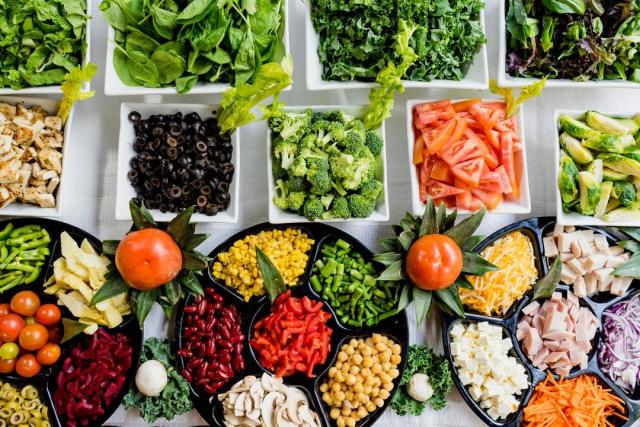Most people wish to live a longer life. However the goal of durability is also to live a better life, with improved psychological and physical health and the capability to be active and independent. In my years as a registered dietitian, I’ve seen a lot of individuals in their 70s, 80s, and beyond who are healthier than folks half their age.
While genes do play a role, way of life is a more significant aspect, and nutrition is a huge piece of the puzzle. A 2016 review of the literature released in the journal Immunity & Ageing points out studies that recommend that 25% of one’s longevity is figured out by genes– the rest is influenced by way of life.
Here are 5 eating habits to embrace to increase your opportunities of extending your life and taking pleasure in each year with vigor.
Consume Your Veggies and Fruit
I understand you hear this one a lot, however eating more fruit and vegetables is truly one of the most essential and impactful habits you can adopt. According to the Centers for Disease Control and Prevention (CDC), just about one in 10 U.S. adults consumes enough veggies and fruit.
In addition to upping your nutrient consumption, reaching those minimums may include years to your life. A 2017 meta-analysis published in the International Journal of Epidemiology discovered that a greater intake of fruits and veggies is associated with a lower threat of mortality from all causes, including heart disease and cancer.
How to Eat More Fruits and Veggies
Integrate in 2 cups of fruit and three cups of veggies daily, with one cup having to do with the size of a tennis ball. Some suggestions: Try entering into a routine of incorporating a cup of fruit into every breakfast, and a second as part of a daily treat. Include one cup of veggies at lunch and two at dinner. Or integrate them. A healthy smoothie made with a handful of greens and a cup of frozen berries knocks out two. You can also add fresh fruit, like sliced apples or orange slices, to entrée salads and stir-fry dishes.
Go Nuts for Nuts and Nut Butters
Nuts are nutrition powerhouses. They provide healthy fat, plant protein, fiber, antioxidants, vitamins, and key minerals, like potassium and magnesium. It’s no wonder they’re linked to life extension.
Results suggest that as nut consumption increased, specific markers for metabolic syndrome reduced. HDL, the excellent cholesterol, likewise increased in ladies involved in the research study (but not the males).
How to Eat More Nuts
An ounce of nuts is about a quarter cup, but 2 tablespoons of nut butter also counts as a serving. Include nuts to salads, prepared veggies, and stir-fry dishes, or eat them as is.
Eat More Meat-Free Meals
Meatless Mondays have actually been a thing for years. That’s wonderful, but for durability, you need to develop plant-based meals into your consuming regimen more than one day a week.
In a 2016 article in the American Journal of Lifestyle Medicine, scientists describe five locations worldwide where individuals live the longest, healthiest lives. Deemed Blue Zones, these areas are found in really varied areas, from Okinawa, Japan to Ikaria, Greece. One commonness they share is the intake of mainly plant-based diets. Beans and lentils are cornerstones, and meat is consumed on average about five times monthly in 3- to four-ounce parts– about the size of a deck of cards.

The only Blue Zone in the US remains in Loma Linda, California, which has the highest concentration of Seventh Day Adventists. This population, known for their primarily plant-based diet plan, lives, usually, 10 years longer than their North American equivalents.
A 2013 study released in JAMA Internal Medicine looked at over 73,000 Seventh Day Adventist men and females and found that compared to omnivores, those who stuck with a vegetarian diet had a considerably lower total mortality risk. This consisted of vegans, lacto-ovo vegetarians (who do consume dairy and eggs), and pesco-vegetarians (who do consume seafood). A 2019 follow-up research study to the 2013 one, released in the Journal of Nutritional Science, found that compared to the diet plan of non-vegetarians, vegetarian diet plans were associated with substantially lower levels of heart disease threat aspects.
And in a 2022 research study in PLOS Medicine, researchers took a look at how food choices impact life expectancy. They identified that the biggest gains in longevity might be made by “eating more legumes, whole grains and nuts, and less red and processed meat.”
How to Eat Less Meat
To gain the advantages, swap the meat in meals for pulses, the umbrella term for beans, lentils, peas, and chickpeas. Usage black-eyed peas in a stir fry in place of meat, and snack on veggies with hummus instead of jerky.
Eat Like a Mediterranean
When it comes to durability, it’s the overall eating pattern, instead of one food or food group, that’s key. A Mediterranean diet plan remains among the gold standards for living longer and more healthfully. This pattern is defined by a high consumption of fruits and vegetables; whole grains; pulses; healthy fats from nuts, olive oil, and avocado; and herbs and spices. It consists of seafood a couple of times a week. The Mediterranean diet also consists of moderate consumption of dairy, eggs, and red wine and limits the intake of meat and sugary foods.
One step of durability frequently mentioned in the research at the cellular level is telomere length. In a nutshell, telomeres are caps discovered at the ends of chromosomes that protect DNA. When they become too short, a cell ends up being old or inefficient. This is why much shorter telomeres are related to a lower life span and an increased danger of developing chronic diseases.
Research study released in 2017 in the journal Oncotarget recommends that greater adherence to a Mediterranean diet is connected to durability through preserving longer telomere length. The same research study revealed that for each one-point increment in the Mediterranean diet score (which determines adherence to the diet plan), the threat of death from any cause comes by 4 to 7%.
How to Eat a Mediterranean Diet
To Mediterranean-ize your meals, change butter with nut butter or avocado on toast and trade it for additional virgin olive oil to sauté vegetables. Snack on fresh fruit with nuts, olives, or roasted chickpeas, and keep meals easy. A well balanced Med-diet dinner may consist of fish served over a bed of greens tossed in extra virgin olive oil with a side of roasted potatoes or quinoa and a glass of pinot noir.
Sip Green Tea
In a 2022 review of the literature released in the journal Nutrients, researchers found that those with the greatest green tea intake had lower rates of cardiovascular illness, as well as a lower threat of passing away from heart illness and stroke. And while it can not be said definitively that drinking green tea will make you live longer, there does appear to be some association between durability and green tea consumption.
How to Drink More Green Tea
In addition to drinking, you can utilize green tea as the liquid in smoothies, oatmeal, or overnight oats, or to steam veggies or whole grain rice. Matcha, a powdered kind of green tea, can likewise be used in drinks and dishes.



